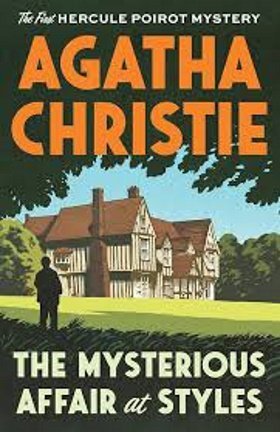“There will be an inquest then?”
Poirot nodded absently. He seemed absorbed in thought; so much so that my curiosity was aroused.
“What is it? You are not attending to what I say.”
“It is true, my friend. I am much worried.”
“Why?”
“Because Mademoiselle Cynthia does not take sugar in her coffee.”
“What? You cannot be serious?”
“But I am most serious. Ah, there is something there that I do not understand. My instinct was right.”
“What instinct?”
“The instinct that led me to insist on examining those coffee-cups. Chut! no more now!”
We followed John into his study, and he closed the door behind us.
Mr. Wells was a pleasant man of middle-age, with keen eyes, and the typical lawyer’s mouth. John introduced us both, and explained the reason of our presence.
“You will understand, Wells,” he added, “that this is all strictly private. We are still hoping that there will turn out to be no need for investigation of any kind.”
“Quite so, quite so,” said Mr. Wells soothingly. “I wish we could have spared you the pain and publicity of an inquest, but of course it’s quite unavoidable in the absence of a doctor’s certificate.”
“Yes, I suppose so.”
“Clever man, Bauerstein. Great authority on toxicology, I believe.”
“Indeed,” said John with a certain stiffness in his manner. Then he added rather hesitatingly: “Shall we have to appear as witnesses—all of us, I mean?”
“You, of course—and ah—er—Mr.—er—Inglethorp.”
A slight pause ensued before the lawyer went on in his soothing manner:
“Any other evidence will be simply confirmatory, a mere matter of form.”
“I see.”
A faint expression of relief swept over John’s face. It puzzled me, for I saw no occasion for it.
“If you know of nothing to the contrary,” pursued Mr. Wells, “I had thought of Friday. That will give us plenty of time for the doctor’s report. The post-mortem is to take place to-night, I believe?”
“Yes.”
“Then that arrangement will suit you?”
“Perfectly.”
“I need not tell you, my dear Cavendish, how distressed I am at this most tragic affair.”
“Can you give us no help in solving it, monsieur?” interposed Poirot, speaking for the first time since we had entered the room.
“I?”
“Yes, we heard that Mrs. Inglethorp wrote to you last night. You should have received the letter this morning.”
“I did, but it contains no information. It is merely a note asking me to call upon her this morning, as she wanted my advice on a matter of great importance.”
“She gave you no hint as to what that matter might be?”
“Unfortunately, no.”
“That is a pity,” said John.
“A great pity,” agreed Poirot gravely.
There was silence. Poirot remained lost in thought for a few minutes. Finally he turned to the lawyer again.
“Mr. Wells, there is one thing I should like to ask you—that is, if it is not against professional etiquette. In the event of Mrs. Inglethorp’s death, who would inherit her money?”
The lawyer hesitated a moment, and then replied:
“The knowledge will be public property very soon, so if Mr. Cavendish does not object——”
“Not at all,” interpolated John.

























